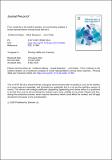From creativity to the creative student, an evolutionary analysis of social representations among future teachers

Type de référence
Date
sous presseLangue de la référence
AnglaisRésumé
In an ever-changing educational context, promoting creativity remains an important issue for teaching professionals. However, the lack of a commonly accepted framework for creativity in schools hinders its implementation in the classroom. Although the effectiveness of training courses dedicated to creativity among teachers is recognized in narrowing the gap with current paradigms of this concept, such as artistic bias, there are still gaps in the understanding and construction of future teachers' social representations of creativity. In this sense, a better knowledge of these representations would help trainers to involve future teachers more effectively in the development of their creative abilities, which could have a positive impact on students. In order to fill these gaps, this study examines the social representations linked to creativity in 212 future teachers of early childhood and upper elementary education. During their training at the University of Teacher Education (HEP Vaud), participants were asked, using a verbal association task, to formulate a number of words or short expressions about “creativity”, “creativity at school” and “the creative student”. After categorizing the results, prototypical analysis enabled us to access the figurative core of the representations and identify emerging themes. Comparison of the constituent elements of each representation enabled us to gain an in-depth understanding of the central and peripheral aspects, as well as their evolution under the influence of training. More specifically, these lead future teachers to modify their initial representations, moving away from implicit theories of creativity. Moreover, significant differences were observed between the components of the social representations of early childhood teachers, who are more process-oriented, and those of higher elementary level teachers, who focus on results. These new elements question the structure of future teachers' representations and contribute to enriching our knowledge of the impact of creativity training, thus offering new perspectives for improving educational and training practices.Titre du périodique
Thinking Skills and CreativityMaison d’édition
ElsevierPays d'édition
Grande-Bretagnep-ISSN
1871-1871e-ISSN
1878-0423Evaluation par les pairs (peer reviewing)
ouiPortée nationale / internationale
internationalePublic(s) cible(s)
Chercheursprofessionels du domaine
Etudiants
URL permanente ORFEE
http://hdl.handle.net/20.500.12162/8369Autre(s) URL(s) permanente(s)
http://doi.org/https://doi.org/10.1016/j.tsc.2025.101860La publication existe uniquement sous forme électronique
ouiDocument(s) associé(s) à la référence
Texte intégral :
Fichier
Accès
Commentaire
Version
Taille
- Tout ORFEE
- Détail référence



